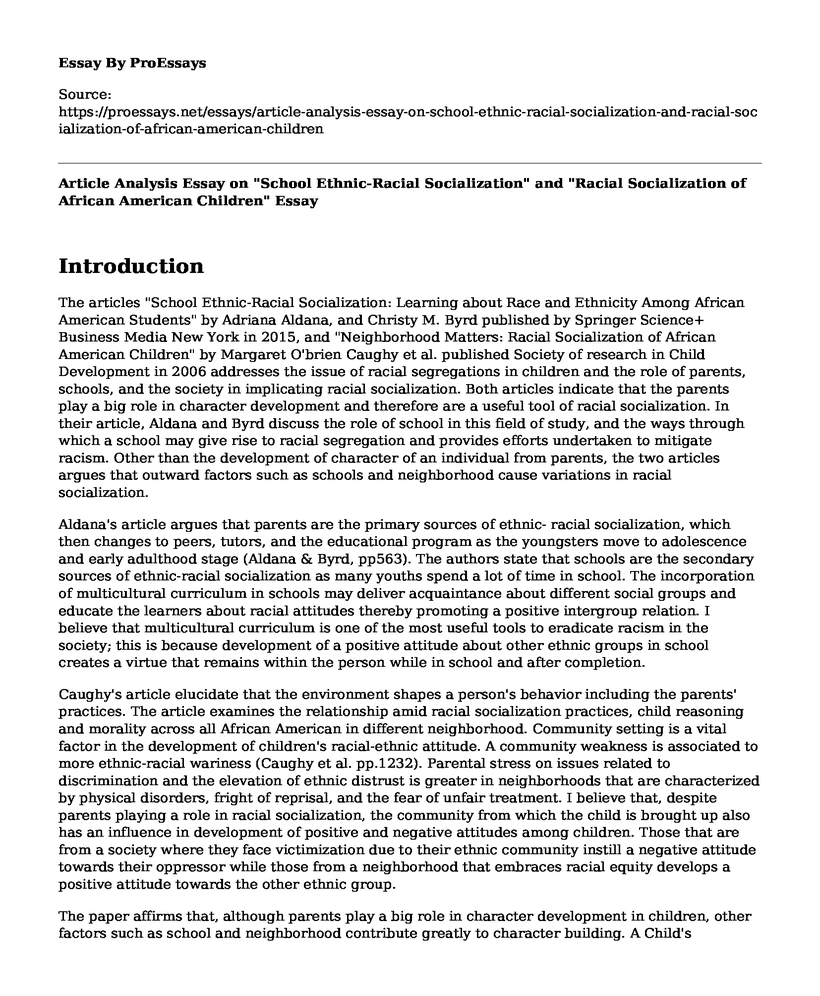Introduction
The articles "School Ethnic-Racial Socialization: Learning about Race and Ethnicity Among African American Students" by Adriana Aldana, and Christy M. Byrd published by Springer Science+ Business Media New York in 2015, and "Neighborhood Matters: Racial Socialization of African American Children" by Margaret O'brien Caughy et al. published Society of research in Child Development in 2006 addresses the issue of racial segregations in children and the role of parents, schools, and the society in implicating racial socialization. Both articles indicate that the parents play a big role in character development and therefore are a useful tool of racial socialization. In their article, Aldana and Byrd discuss the role of school in this field of study, and the ways through which a school may give rise to racial segregation and provides efforts undertaken to mitigate racism. Other than the development of character of an individual from parents, the two articles argues that outward factors such as schools and neighborhood cause variations in racial socialization.
Aldana's article argues that parents are the primary sources of ethnic- racial socialization, which then changes to peers, tutors, and the educational program as the youngsters move to adolescence and early adulthood stage (Aldana & Byrd, pp563). The authors state that schools are the secondary sources of ethnic-racial socialization as many youths spend a lot of time in school. The incorporation of multicultural curriculum in schools may deliver acquaintance about different social groups and educate the learners about racial attitudes thereby promoting a positive intergroup relation. I believe that multicultural curriculum is one of the most useful tools to eradicate racism in the society; this is because development of a positive attitude about other ethnic groups in school creates a virtue that remains within the person while in school and after completion.
Caughy's article elucidate that the environment shapes a person's behavior including the parents' practices. The article examines the relationship amid racial socialization practices, child reasoning and morality across all African American in different neighborhood. Community setting is a vital factor in the development of children's racial-ethnic attitude. A community weakness is associated to more ethnic-racial wariness (Caughy et al. pp.1232). Parental stress on issues related to discrimination and the elevation of ethnic distrust is greater in neighborhoods that are characterized by physical disorders, fright of reprisal, and the fear of unfair treatment. I believe that, despite parents playing a role in racial socialization, the community from which the child is brought up also has an influence in development of positive and negative attitudes among children. Those that are from a society where they face victimization due to their ethnic community instill a negative attitude towards their oppressor while those from a neighborhood that embraces racial equity develops a positive attitude towards the other ethnic group.
The paper affirms that, although parents play a big role in character development in children, other factors such as school and neighborhood contribute greatly to character building. A Child's character development basically starts from the parents and then extends to school where a lot of time is spent, to the neighborhood. Children develop their behaviors through peers, teachers, adults in the community, and their encounters. The development of multicultural curriculum in school helps to create a positive attitude to the students about other ethnic groups by appreciating their culture. Neighborhood is also a major key in development of behaviors, there is the development of negative attitude about races among children in a community where they face victimization, and a positive one in a community that appreciates every ethnic group. When children are racially socialized, racism becomes a less issue in the future society.
Woks Cited
Adriana Aldana & Christy M. Byrd. School Ethnic-Racial Socialization:Learning about Race and Ethnicity Among African American Students. 2015 47:563-576. Print.
Margaret O'Brien Caughy, Saundra Murray Nettles, Patricia J. O'Campo, & Kimberly Fraleigh Lohrfink. Neighborhood Matters: Racial Socialization of African American Children. 2006 77: 1220-1226. Print.
Cite this page
Article Analysis Essay on "School Ethnic-Racial Socialization" and "Racial Socialization of African American Children". (2022, Dec 14). Retrieved from https://proessays.net/essays/article-analysis-essay-on-school-ethnic-racial-socialization-and-racial-socialization-of-african-american-children
If you are the original author of this essay and no longer wish to have it published on the ProEssays website, please click below to request its removal:
- Literature Review Sample: The Oppressive Jim Crow Laws
- Drug Abuse in Athletes: The Need for Weed Essay
- Sexual Harassment in Public Places: Experience of Canadian Women
- Essay Sample on Teaching Learning and Assessment
- Immigration to America in Late 1800s: Reasons & Effects - Essay Sample
- Essay on Exploring Social Disparities in Relocation and Integration of Undocumented Foreigners
- Essay on Developing Children: Maximizing Their Potential Through Learning







